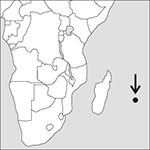
Source: MAPS IN MINUTES™ © RH Publications (1997)
Capital:
Port Louis
Area:
2040 sq km (788 sq miles)
Population:
1,322,238 (2013 est)
Currency:
1 Mauritian rupee=100 cents
Religions:
Hindu 48.5%; Roman Catholic 26.3%; Muslim 17.3%; other Christian 6.4%
Ethnic Groups:
Indo-Mauritian 68.0%; Creole 27.0%; Sino-Mauritian 3.0%; Franco-Mauritian 2.0%
Languages:
English (official); Creole; Bhojpuri; French
International Organizations:
UN; Non-Aligned Movement; Commonwealth; AU; SADC; WTO
An island country lying in the southern Indian Ocean, about 800 km (500 miles) to the east of Madagascar; it is also the name of the principal island (the others are Rodriguez and the Agalega Islands).
Physical
The main island, Mauritius itself, is volcanic in origin and nearly 2000 sq km (770 sq miles) in area, having steep hills and plains of lava, which have weathered into fertile soil. The slopes are forested, and the plains are green throughout the year with natural vegetation. Tropical cyclones frequently occur.
Economy
The main exports of Mauritius are clothing, textiles, and sugar, which is grown on 90% of cultivated land. Tourism and financial services are also important economic activities, and the government is encouraging the growth in such new areas as fish processing and information and communications technology.
History
Visited by the Arabs in the 10th century and discovered by the Portuguese in 1511, the island was held by the Dutch (1598–1710), and the French (1710–1810). The British took it in 1810, and under their rule massive Indian immigration took place. Mauritius became an independent state within the Commonwealth of Nations in 1968. Sugar has always been the principal crop, and the fall of world prices in the 1980s resulted in a vigorous programme of agricultural diversification. Politically it has maintained stability as a multicultural state, with the Mauritian Socialist Party, led by Sir Anerood Jugnauth, dominating politics from 1982. In 1992 Mauritius became a republic. Caseem Uteem was elected to the largely ceremonial role of President in 1992. General elections were held in 1995 following the collapse of the government and the opposition alliance, led by Navin Ramgoolam, was elected. Jugnauth returned to power in 2000. President Uteem resigned in 2002 rather than approve a new anti-terrorism law. The law was eventually approved by one of a series of short-term presidents that lasted until Jugnauth assumed the post in 2003, being replaced as Prime Minister by Paul Raymond Bérenger. However, Bérenger was defeated in the 2005 general election by Ramgoolam, who was re-elected in 2010. Concerns over his proposed changes to the constitution led Jugnauth to stand down as President and return to frontline politics. In 2014, he led the Alliance LePep coalition to victory and became Prime Minister again. To indicate that power should stay with the Prime Minister, he proposed an independent President, Ameenah Gurib-Fakim, an academic chemist, who took up office in 2015. In 2017, Sir Aneerood stood down as Prime Minister, to be replaced by his son, Pravind Jugnauth.
- Károlyi, Mihály, Count (1875–1955)
- Köhler, Georges J. F.
- Köhler, Wolfgang (1887–1967)
- Kölliker, Rudolph Albert von
- König eyepiece
- Königgrätz
- Königsberg bridge problem
- Königsberg bridges problem
- Königsberger ratio
- König’s paradox
- Köppen climate classification
- Köppen, Wladimir Peter
- Köppen, Wladimir Peter (1846–1940)
- Köprülü
- Kühne, Wilhelm Friedrich
- k‐simplex
- K–Ar method
- K–T boundary
- L
- L2TP
- label
- labelling
- labelling algorithm
- labes
- labia